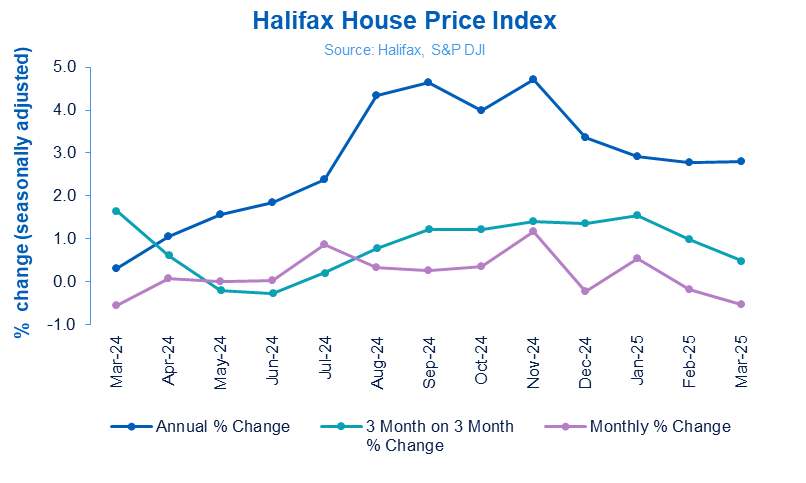UK house prices recorded a sharper-than-expected monthly fall in March, declining by 0.5% – more than double February’s drop of 0.2% – latest figures from Halifax reveal.
The average price of a home now stands at £296,699, down £1,575 from the previous month.
Despite the monthly decline, the annual rate of growth held firm at 2.8%, suggesting the market remains resilient amid shifting buyer behaviour and evolving economic conditions.
Amanda Bryden, Head of Mortgages at Halifax, attributed the fall to a post-rush slowdown following a surge in completions ahead of the March stamp duty deadline.
STAMP DUTY DEADLINE

She says: “House prices rose in January as buyers rushed to beat the March stamp duty deadline. However, with those deals now completing, demand is returning to normal and new applications are slowing.”
She added: “March saw more completions than January and February combined, including our busiest single day on record.
“Following this burst of activity, prices – which remain close to record highs- unsurprisingly dipped.”

REGIONAL DIVIDE
While the UK’s overall average price fell, regional data revealed a stark divergence across the country.
 Northern Ireland led the way with annual price growth of 6.6%, bringing the average home value to £206,620. Scotland followed with a 4.3% rise to £213,750, up from 3.8% in February.
Northern Ireland led the way with annual price growth of 6.6%, bringing the average home value to £206,620. Scotland followed with a 4.3% rise to £213,750, up from 3.8% in February.
Wales also recorded robust growth at 3.7%, with average prices hitting £227,332. In England, Yorkshire and the Humber saw prices climb 4.2% year-on-year, with homes now averaging £215,807.
In contrast, London continues to lag, with annual growth slowing from 1.5% in February to 1.1% in March. Despite subdued growth, the capital still commands the UK’s highest average property price at £543,370.
AFFORDABILITY
But Bryden warned: “Potential buyers still face challenges from the new normal of higher borrowing costs, a limited supply of available properties, and an uncertain economic outlook.
“With further base rate cuts anticipated and positive wage growth, mortgage affordability should continue to improve gradually. We still expect a modest rise in house prices this year.”
INDUSTRY REACTION

Gareth Samples, chief executive of The Property Franchise Group, said: “The stabilisation of house prices reflects a maturing market, where increased supply and steady demand are creating a more balanced environment for buyers and sellers alike.
“With competition at its highest level in a decade and more homes available than in recent years, buyers have greater negotiating power, leading to price sensitivity. However, the sustained level of transactions and mortgage approvals signals continued confidence in the housing market.
“As interest rates remain stable and economic conditions evolve, we anticipate a measured yet positive trajectory for the market throughout 2025.”
PURCHASES BROUGHT FORWARD

Jeremy Leaf, north London estate agent and a former RICS Residential Chairman, says: “Although the small reduction in house prices noted last month has continued, activity still held up relatively well as the figures will not cover transactions which completed before the deadline to take advantage of the stamp duty concession.
“There’s no doubt that many purchases were brought forward as a result so we might have expected to see more impact in the data.
“Buyers and sellers who missed out on the stamp duty savings had the choice to stay put, keep to previously-agreed terms and continue with their move or try to re-negotiate in an attempt to find some middle ground. The last option has proved the most popular in our offices.
“However, worries about short-and-longer term economic prospects both here and abroad, have been driving that decision-making (or lack of it) over the past few weeks at least.”
RATE CUTS EXPECTED

Tom Bill, head of UK residential research at Knight Frank, said: “As buyers adapt to higher rates of stamp duty, the positive news is that US trade tariffs announced last week have put downwards pressure on borrowing costs as markets price in an economic slowdown.
“The Bank of England is now expected to cut rates three times this year rather than twice. The risk is that tariffs ultimately prove to be inflationary, and the spillover effects mean upwards pressure on mortgage costs in the UK.
“For now, the spring market feels steady although the prospect of a tax-raising autumn Budget will throw more uncertainty into the mix later this year.”
CONFIDENCE BOOST

Jason Tebb, President of OnTheMarket, says: “The housing market continues to shake off external economic concerns demonstrating remarkable resilience, with good levels of activity and interest, particularly ahead of the end of the stamp duty concession.
“Recent base rate cuts have done much to provide a boost to confidence and activity in the market. With the stamp duty savings now behind us, further rate reductions from the Bank of England would be timely, providing much-needed impetus as the year progresses.
“The relative steadiness of house prices suggests that affordability is keeping a lid on values with buyers not prepared to pay inflated amounts. Sellers keen to take advantage of what is traditionally a busy spring market should seek advice from an experienced agent to take into account local market nuances and price accordingly if they wish to achieve a timely sale.”
PRICES WILL STRENGTHEN

Jean Jameson, Chief Sales Office for Foxtons, says: “The property market momentum seen throughout 2024 has continued over the first quarter of this year, with the recent reductions to interest rates and the resulting improvements to mortgage affordability proving to be the greatest motivator for homebuyers entering the market in 2025.
“As the year progresses, we expect to see house prices continue to strengthen, buoyed by the prospect of further interest rate reductions.”
FAVOURABLE MORTGAGES

Verona Frankish, Chief Executive of Yopa, says: “Despite a marginal month on month reduction, the long-term view of the UK property market shows that house prices continue to sit higher than they did this time last year and even versus the previous quarter.
“The nation’s homebuyers have responded favourably as mortgage rates have fallen from the peak seen in August 2023 and whilst they may remain considerably higher than they’ve become accustomed to, market confidence and property values have grown in line with the expectation that the cost of borrowing is only set to trend downwards over the coming year.”
FIGHTING FIT

Marc von Grundherr, Director of Benham and Reeves, says: “The property market remains fighting fit despite the wider economic turbulence faced on numerous fronts, not least from Trump and his tariff war, and whilst we may see the odd monthly adjustment, the real proof in the pudding is a robust level of annual growth.
“So whilst homeowners could find that the cost of some imported US items might rise should the UK government take a tit for tat approach towards Trump, it could result in a swifter reduction in mortgage rates if inflation remain stubbornly persistent and the Bank of England moves to curb it with a hastened schedule of interest rate cuts.”
OPPORTUNITY KNOCKS

Nathan Emerson, Chief Executive of Propertymark, says: “This house price reduction will be a huge disappointment to many sellers hoping to make gains on a house sale to climb up the housing ladder, but it could also be an opportunity for aspiring homeowners to take advantage of the slight reduction in house prices and take their first step, or next step, onto the housing ladder.
“Hopefully this month on month dip is only temporary. The spring and summer months normally spur on a flurry in housing activity, especially at a time when there are many competitive mortgage deals out there right now as a result of the reduction in interest rates last year.
“However, with housing playing a vital role in the UK economy, international events could jeopardise the Bank of England’s target of a 2% inflation rate, which may thwart their ambitions to reduce interest rates further. The housing market must remain stable ahead of the Bank of England’s next decision on interest rates in May.”
COMPETITIVE MARKET

David Johnson, managing director of INHOUS, says: “In March, the property market has seen a high level of buyer activity which was partially boosted by American house hunters looking to relocate to the UK.
“This uplift in buyer demand is contributing to a competitive spring market which sees the majority of sellers achieving their asking price if valued accurately.
“We advise buyers to start their search as early as possible and be prepared for tough price negotiations.”
ECONOMIC SHIFTS

Jonathan Handford, Managing Director at national estate agent group Fine & Country, says: “House prices dipped in March, reflecting a market adjusting to economic shifts and tax policy changes.
“As the April deadline for stamp duty changes loomed, many buyers rushed to complete purchases to avoid higher taxes, but the timing caused a softening of prices month-on month.
“With the stamp duty relief threshold for first-time buyers dropping from £425,000 to £300,000, March marked the closing of a key window of opportunity — sparking what some dubbed the ‘awful April’ rush, as buyers scrambled to avoid higher stamp duty costs.
“Adding to the cautious sentiment, inflation unexpectedly dropped to 2.8%, offering a glimmer of hope that cost-of-living pressures may ease.”
AFFORDABILITY CHALLENGE
And he adds: “Although the Bank of England held interest rates at 4.5% in March, some experts are now anticipating the possibility of further rate cuts due to falling inflation and global economic challenges, such as new US trade tariffs. This could see lenders start offering slightly lower fixed-rate mortgage deals.
“For first-time buyers, the combination of falling inflation, more stable borrowing conditions, and the urgency around tax changes created a brief window of opportunity. However, affordability remains a challenge, particularly in higher-priced areas, and the rise in the stamp duty threshold will only make it more difficult.
“While March saw a dip in house prices, demand may temper post-deadline. However, with spring being a traditionally busier period for sales, there’s potential for activity to pick up, particularly if expectations for interest rate cuts continue to grow.
“For now, the market remains active but cautious, with buyers and sellers navigating a landscape shaped by turbulent economic and policy factors.”










